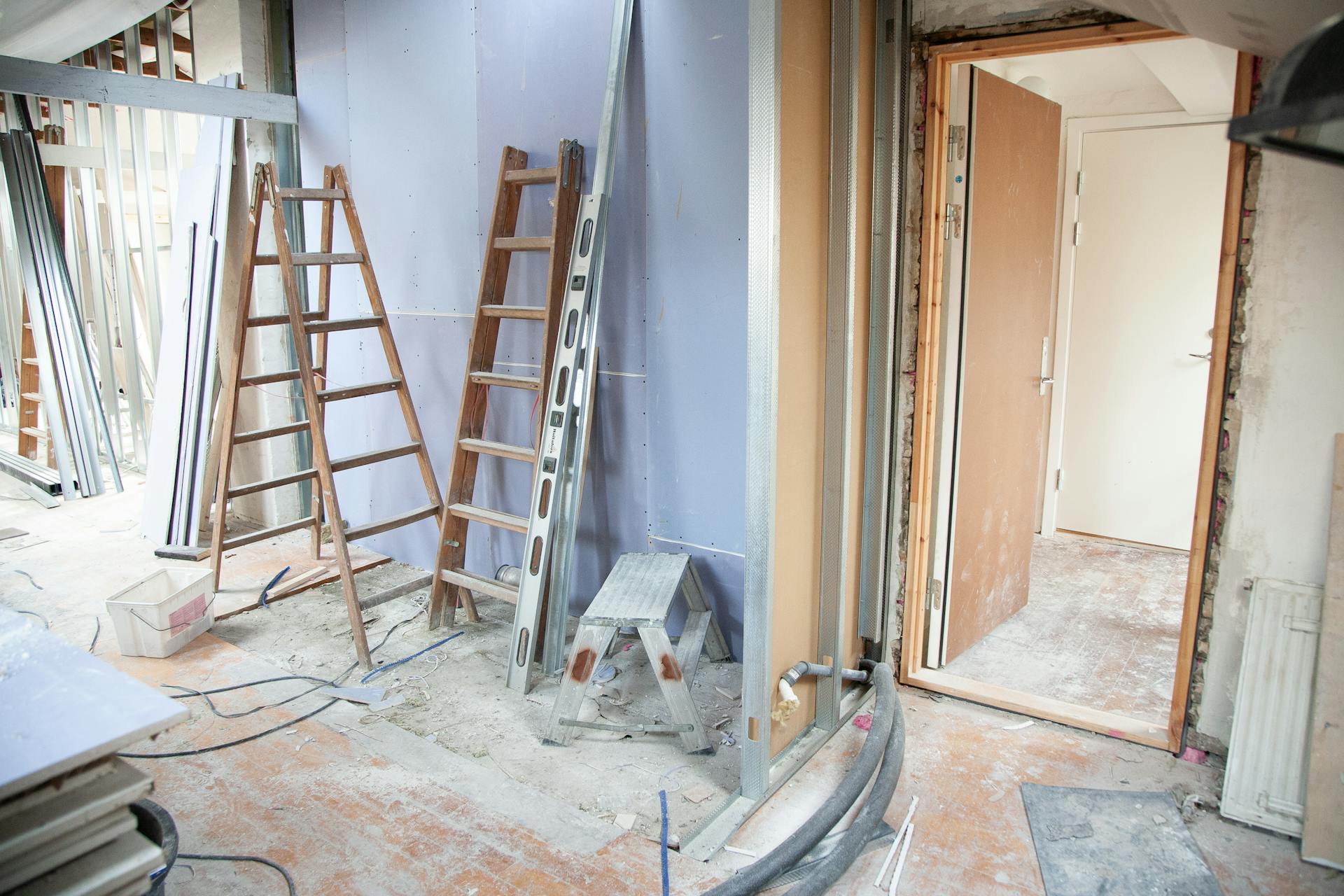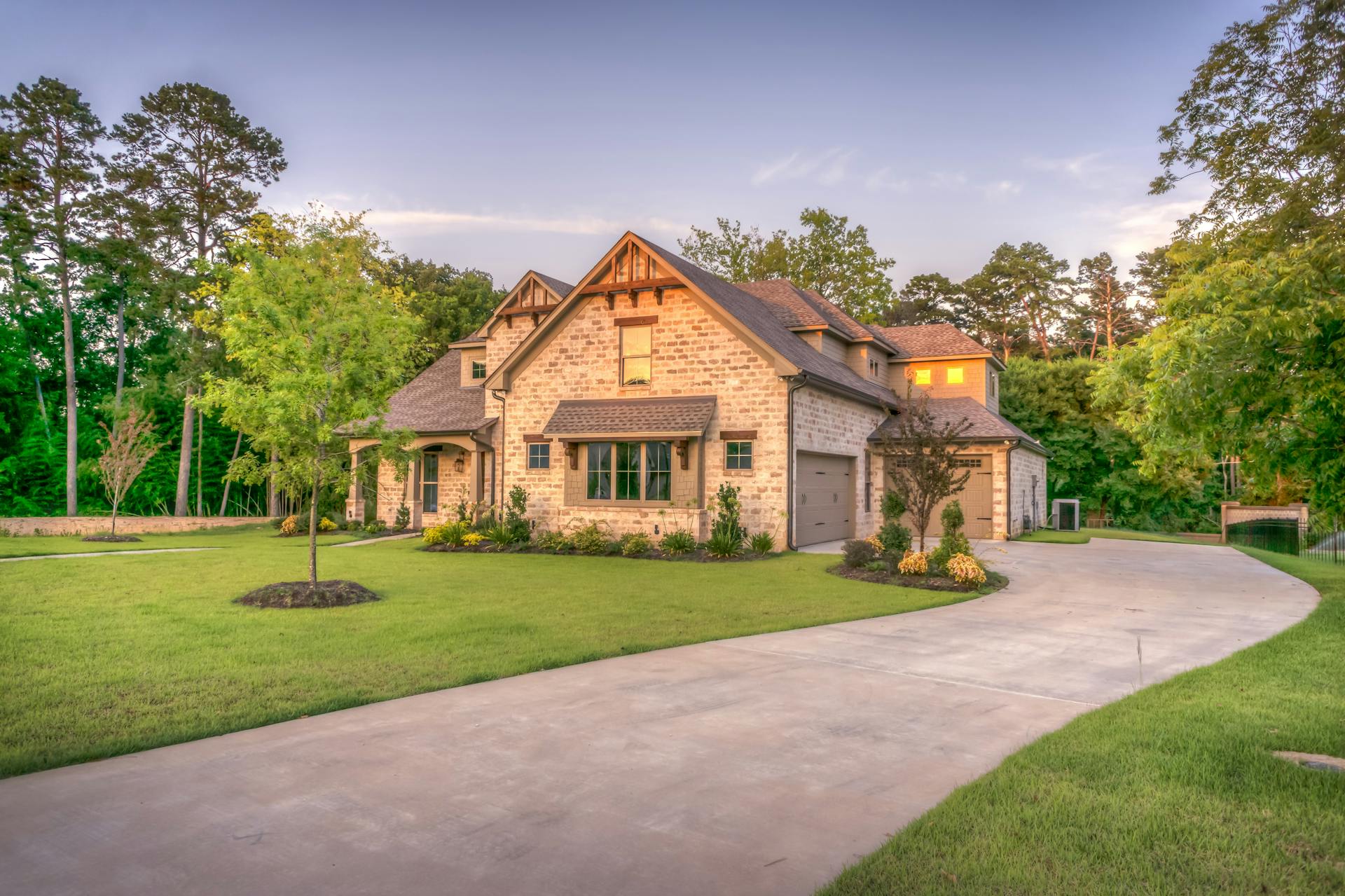
Flipping houses can be a lucrative venture, but it's essential to understand the basics before diving in. You can expect to earn a profit of 10% to 20% on a flipped house, depending on the location and condition of the property.
To get started, you'll need to secure financing, which can be done through a hard money lender or a traditional bank loan. A hard money lender typically offers a higher interest rate, but a faster closing process.
You can find potential properties by driving through neighborhoods, attending auctions, or working with a real estate agent. Keep an eye out for houses that are priced significantly lower than similar properties in the area.
It's also crucial to research the local market and understand the demand for properties in the area you're interested in. This will help you determine which types of properties to target and how much to invest.
For more insights, see: Hard Money Lenders for Flipping Houses
How to Start
To start flipping houses, you need to limit your financial risk and maximize your return potential. This means you shouldn't pay too much for a home, and you should know how much the necessary repairs or upgrades will cost before you buy.
The 70% rule is a good guideline to follow. It states that an investor should pay no more than 70% of the after-repair value (ARV) of a property less any repairs that are needed.
To determine the ARV, you need to know what a home is worth after it is fully repaired. For example, if a home's ARV is $150,000 and it needs $25,000 in repairs, then you should pay no more than $80,000 for the home.
Flipping a house requires time, money, planning, patience, skill, and effort. It's not a get-rich-quick scheme, and it's not something to take lightly.
Here are the key steps to follow when calculating the purchase price of a home:
Remember, even if you get every detail right, changing market conditions could mean that every assumption you made at the beginning will be invalid by the end.
Understanding the Process
The key to flipping houses is to buy low and sell high, but speed is crucial - you want to complete the transaction as quickly as possible to limit the time your capital is at risk.
Each day costs you money in mortgage, utilities, property taxes, insurance, and other expenses associated with homeownership. This is why focusing on speed over maximum profit is essential.
To get started, you'll need to find a suitable property, secure funding for the investment and updates, complete renovations and repairs, and market and sell the updated property. Here's a breakdown of the process:
- Find a suitable property
- Secure funding for the investment and updates
- Complete renovations and repairs
- Market and sell the updated property
Some investors use their profits from the first house to invest in additional properties to flip, making it a potentially lucrative side income.
What Is Flipping Houses?
Flipping houses is a real estate investment strategy where you buy a property at a low price, renovate it, and sell it for a higher price, making a profit in the process. This can be a lucrative business, but it requires careful planning and execution.
The goal of house flipping is to make a profit by increasing the value of the property through renovation and resale. According to our research, a typical house flip involves a 10-20% increase in value.
A fresh viewpoint: How to Value Reits
You can flip houses in various ways, including buying foreclosed properties, buying fixer-uppers, or even buying properties at auctions. In fact, our data shows that foreclosed properties can be a great source of cheap houses to flip.
Renovating a house can be a costly and time-consuming process, but it's also an opportunity to add value to the property. A typical house flip renovation can cost anywhere from $10,000 to $50,000 or more, depending on the scope of the project.
House flipping can be a rewarding business, but it's not without risks. According to our research, the average house flipper loses money on about 1 in 5 projects.
Check this out: Blackstone Buying Reits
How It Works
The key to flipping houses is to buy low and sell high. This strategy is all about speed, as each day costs you more money in mortgage, utilities, property taxes, insurance, and other costs associated with homeownership.
Timing is everything in real estate, and you need to be prepared to act quickly when you find a suitable property. This means having a solid plan in place and the necessary funds to secure the investment and make any necessary updates.
To get started, you'll need to find a suitable property, secure funding, complete renovations and repairs, and market and sell the updated property. This process can be straightforward, but it requires attention to detail and a willingness to take calculated risks.
Here's a step-by-step overview of the house-flipping process:
- Find a suitable property
- Secure funding for the investment and updates
- Complete renovations and repairs
- Market and sell the updated property
Some investors enjoy the house-flipping process so much that they use their profits from the first house to invest in additional properties to flip. This can be a great way to build wealth over time, but it requires careful planning and execution.
How Long Does It Take?
The length of time it takes to flip a house can vary, but the average is about four to six months from purchase to selling the finished home.
Each project is different, and some may take only a month or so, while others may require heavier work.
Professional builders and skilled professionals often flip houses as a side income, and they usually have the knowledge, skills, and experience to find and fix a house quickly.

Timing is everything, especially in real estate, and knowing how long it takes to flip a house can affect the amount of profit you'll make.
According to Attom, it takes approximately 6 months to flip a house, but it's essential to understand the factors that determine this to speed up the process.
The key to successful flipping is to buy low and sell high, and completing the transaction as quickly as possible limits the time your capital is at risk.
Real Estate License and Legal Protection
Having a real estate license can offer a layer of legal protection for all parties involved in a transaction.
Real estate licenses come with a set of ethical and professional standards that provide a safeguard against potential disputes. This is especially important when dealing with buyers, sellers, or other agents.
If you operate without a license and run into legal disputes, you may be at a disadvantage when it comes to legal recourse. This can put you and others involved in the transaction at risk.
A unique perspective: When Should You Repipe a House?
The need for a real estate license to flip houses depends on your specific circumstances and the laws of your state. If you plan to engage in house flipping as a business, consider the benefits a license can offer.
Access to the Multiple Listing Service (MLS) is one of the benefits of having a real estate license. This can give you a competitive edge in finding and selling properties.
A real estate license can also provide a professional network of contacts and resources. This can be incredibly helpful when navigating the complexities of a house flipping business.
Related reading: Real Estate License Flipping Houses
Property Acquisition
Finding the right property to flip requires extensive knowledge of the real estate market and identifying properties with potential for improvement. You'll need to assess whether the resale value could yield a profit after paying for renovations.
To find houses to flip, look on foreclosure sites, such as Foreclosures.com, or attend auctions, where you may face bidding wars. Be ready to offer all-cash for a compelling bid. You can also drive around your target neighborhood to spot properties in distress.
If this caught your attention, see: Landbank Properties
Networking with wholesalers is another great way to find undervalued properties. They need house flippers like you to resell the property for a retail price. Working with an agent can also help you locate undervalued properties more effectively, as they have access to the MLS.
Here are some key resources to find houses to flip:
- Foreclosures.com
- Probate and foreclosure auctions
- Local REI groups and associations
- Wholesalers
- Licensed real estate agents
Make an Offer
Making an offer on a property is a crucial step in the property acquisition process. Your offer needs to be competitive enough to stand out from other offers but low enough so that you will be sure to make a profit.
To determine the right purchase price, you need to consider the after-repair value (ARV) of the property. This is the value of the property once all repairs have been made. The 70% rule suggests that you should not spend more than 70% of the ARV minus any necessary repairs.
For example, if the property's ARV is $100,000 and it needs $20,000 in repairs, then you should pay no more than $50,000 for the property.
Here are the steps to follow when making an offer:
- Estimate the property's ARV
- Estimate the cost of necessary repairs
- Take 70% of the ARV and subtract the cost of repairs
- Use the result to determine the maximum you should pay for the property
Securing the right purchase price will significantly influence the profits you can make on a deal. You need to determine the right purchase price for your ARV and make a strong offer on the property.
How to Find a Property
Finding the right property to flip requires extensive knowledge of the real estate market, so it's essential to research the market thoroughly.
You can begin by researching the housing market, learning where people want to live and determining any popular housing trends. Partnering with a real estate agent or REALTOR can be beneficial in understanding market conditions and determining necessary repairs.
To start searching for properties, look on foreclosure sites, such as Foreclosures.com, or attend auctions, where you can find properties being sold at deep discounts. Be prepared for bidding wars, and consider offering all-cash to make your bid more compelling.
Driving around your target neighborhood can also be an effective way to find undervalued properties. Look for signs of distress, such as boarded-up windows, overgrown yards, or piles of mail and newspapers. Write down the address and do some online research to find the owner or seller so that you can make an offer.
Joining your local REI group or networking with wholesalers can also connect you with potential deals and partnerships. Wholesalers need house flippers like you in order for their business to be successful, and they can provide you with undervalued properties at a wholesale price.
Here are some popular cities for house flipping, according to New Silver, which provides capital to real estate investors: Jacksonville, Atlanta, El Paso, Charlotte (North Carolina), and Hartford (Connecticut).
You can also search property listings on websites like Zillow.com and Realtor.com, and search public records and newspapers for foreclosure listings, which can represent profitable flips.
Obtain Necessary Permits
Obtaining necessary permits is a crucial step in the property acquisition process. You'll need to work with your head contractor to determine which permits you'll need to obtain before the start of the project.
More often than not, investors will need to obtain permits for a rehab property. This ensures that the work done is up to code and compliant with local regulations.
To determine which permits you'll need, consult your state and local government websites for more information on how to file for permits.
You might enjoy: What Are Reits and How Do They Work
Rehabilitation and Renovation
Hiring the right renovation team or doing it yourself is a crucial decision that can make or break your flipping house profits. If you don't have the skills, tools, knowledge, time, or energy to complete the work yourself, you may need to hire a team to get the job done.
Deciding whether to hire a team or go DIY can be a tough call, but it's essential to weigh the costs and benefits of each option. The key is to determine what renovation or remodeling projects will improve the property's value and then decide how to tackle them.
5. Hire a Renovation Team or DIY
Deciding whether to hire a renovation team or tackle the project yourself is a crucial step in the rehabilitation and renovation process. If you don't have the skills, tools, knowledge, time, or energy to complete the work yourself, hiring a team is a must.
Hiring a team can eat into your profits, but it's better than risking a botched job. You must weigh the costs and benefits of each option carefully.
The right renovation team can make all the difference in the success of your project. Interviewing multiple contractors is essential to get an accurate estimate of the repair costs and timeline required.
Finding the right team can take time, so don't be afraid to keep searching until you find the right contractor for the job.
Worth a look: Is Now a Good Time to Invest in Reits
Itemize Rehab Budget
Itemizing your rehab budget is a crucial step in the house flipping process. You need to review the estimated costs of the flip to identify areas that need to be prioritized or changed before the renovation starts.
You might enjoy: How Much Money Do You Need to Start Flipping Houses
To create a comprehensive budget, you should work with your contractor to finalize a timeline and schedule for the renovation, always leaving extra room in the final estimate in case any unexpected issues arise.
As you review the estimated costs, keep in mind that you'll also have monthly payments that will cut into your profits, so it's best to finish renovations in a timely manner.
There are several financing options to consider, including a cash-out refinance, a home equity line of credit (HELOC), and a hard money loan. These options can help you secure the funds needed for repairs and renovation, but be aware that hard money loans have high interest rates and can require down payments up to 40%.
Here are some key factors to consider when itemizing your rehab budget:
- Estimated costs of materials and labor
- Timeline and schedule for the renovation
- Monthly payments and their impact on profits
- Financing options and their associated costs
By carefully itemizing your rehab budget, you can ensure that you have a clear understanding of the costs involved and can make informed decisions about how to proceed with your house flipping project.
Final Inspection
The final inspection is a crucial step in the rehabilitation and renovation process. You'll need to do a final walk-through with your contractor as the project draws to a close.
This is your chance to ensure that all changes are up to code, just like it says in the contract. The house will need to pass the final inspection before you can consider the project complete.
After completing the renovation project, the house will need to be inspected again to ensure the changes are up to code. The inspection will help you catch any last-minute issues before they become major problems.
Selling the Property
Selling the property is a crucial step in the house flipping process. It's what makes all the hard work worth it.
You'll want to give your house a competitive sale price for potential buyers. This will help you sell the house quickly and for a good price.
Hiring a real estate agent who knows the market and how to sell your home can be a big help. They can guide you on pricing and marketing the property.
Be aware of how long similar houses tend to stay on the market before sale. This can give you an idea of how long it may take to sell your own property.
The profit from selling the property is calculated by subtracting the total costs from the sale price. This includes the purchase price, renovation expenses, insurance, closing costs, and more.
To maximize your profit, it's essential to price your flip competitively. The more offers you get in, the more you'll be able to get for the property.
Here's a rough idea of the factors to consider when pricing your property:
Challenges and Considerations
Flipping houses can be a profitable venture, but it's essential to consider the challenges and considerations involved. You may need to talk with a tax specialist before starting to understand the tax ramifications of house flipping, which can vary depending on your area and the frequency of your flips.
Tax implications can significantly affect your bottom line, so it's crucial to be aware of them. A real estate license may not be required, but having a solid understanding of real estate laws, contracts, and regulations in your area is vital. This knowledge can help you navigate the purchase and sale process, negotiate contracts, and ensure compliance with legal requirements.
Overestimating the after-repair value (ARV) of a property can be a common mistake, so conduct thorough market research and consult with a real estate expert to get a realistic estimate. Use comparable sales in the area to ground your expectations.
Check this out: Why Is It so Humid in My House?
Mistakes to Avoid
Overestimating the After Repair Value (ARV) can be a costly mistake. Conduct thorough market research and consider consulting with a real estate expert to get a realistic estimate.
Use comparable sales in the area to ground your expectations. This will help you avoid falling into the trap of wishful thinking about the potential selling price of your flipped house.
Underestimating costs can lead to budget overruns. Add a contingency of at least 10-20% to your projected renovation costs to cover unexpected expenses.
Begin with a detailed project scope and secure comprehensive quotes from contractors. Regularly review and adjust your budget as the project progresses.
Skipping inspections might seem like a time and money saver, but it can lead to costly surprises down the road. Invest in a reliable inspector to uncover potential issues early on.
Here are some common mistakes to avoid when flipping houses:
- Overestimating ARV
- Underestimating costs
- Skipping inspections
Misconceptions
House flipping may be surrounded by myths that can deter beginners from taking the plunge.
One common misconception is that house flipping is a get-rich-quick scheme. Misconceptions in House Flipping states that this myth can deter beginners from exploring the profitable potential of flipping houses.
In reality, flipping houses requires a significant amount of time, effort, and expertise.
Many people assume that finding a diamond in the rough is easy, but Misconceptions in House Flipping reveals that this is not the case. House flipping may be surrounded by myths that can deter beginners from taking the plunge.
Renovations often cost more than expected, and finding the right buyers can be challenging.
Not Enough Time
Flipping houses is a time-consuming endeavor that can take months to find the right property. It's a significant commitment, especially if you have a day job.
You'll need to give up personal time on demolition and construction, which can be a challenge. Flipped homes accounted for 8.4% of all home sales in the United States in 2022.
If you pay someone to do the work for you, you'll spend more time than you expect supervising the activity. This can add up quickly, reducing your profit.
Scheduling inspections to ensure the property complies with building codes can be a lengthy process. You'll need to spend time and money to bring it up to par if it doesn't pass.
Selling the property also requires a significant time commitment. You may spend plenty of time commuting to and from the property and in meetings with potential buyers.
Not Enough Skills
Not having the right skills can be a major roadblock in house flipping. You need to know how to do things yourself, like laying carpet and installing a kitchen sink, to save money and increase your profit.

Paying a professional to do the work can eat into your profit margins, making it harder to make a substantial profit on your investment. If you don't have the skills, you'll need to hire someone to do the job, which can be expensive.
Not having the right tools is also a problem, as it can be hard to find a good contractor who knows what they're doing. In this case, you might need to pay a premium for their services.
Lack of skills can also lead to delays in the renovation process, which can cost you money and cause stress.
Consider Tax Implications
Tax implications can greatly impact your bottom line, so it's essential to consider them before flipping houses. The tax ramifications can vary depending on your area, the frequency of your flips, and how long you hold onto each property.
You may need to consult a tax specialist to understand how flipping houses will affect your tax bill. This includes considering how your status as a real estate agent may alter your tax situation.
Big-league lenders have started seeking profits in the flip-loan marketplace, which can impact your tax obligations. Knowing the applicable tax laws is crucial to avoid any potential pitfalls.
A real estate license may not be required, but having a solid understanding of real estate laws, contracts, and regulations in your area is vital. This knowledge can help you navigate the purchase and sale process and ensure compliance with legal requirements.
Having knowledge of what can go wrong, such as liability issues, can really help reduce your risk, as Bill Gallagher, a Charlotte, NC, real estate agent, pointed out.
Frequently Asked Questions
What is the 70% rule in house flipping?
The 70% rule in house flipping is a guideline that advises investors to purchase a property for no more than 70% of its after-repair value minus renovation costs. This rule helps flippers determine a fair purchase price to ensure a profitable flip.
What is the house flipper 70% rule?
The 70% rule is a guideline for house flippers to ensure they don't overpay, limiting their purchase price to 70% of a property's potential value after repairs. This rule helps flippers avoid financial losses and make more profitable deals.
Sources
- https://www.fortunebuilders.com/p/flipping-houses/
- https://www.investopedia.com/articles/mortgages-real-estate/08/house-flip.asp
- https://www.bankrate.com/real-estate/flipping-houses/
- https://www.rockethomes.com/blog/housing-market/how-to-flip-a-house
- https://www.colibrirealestate.com/career-hub/blog/everything-you-need-to-know-about-flipping-houses/
Featured Images: pexels.com


